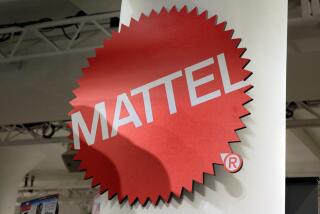Reuters is new target in bids for content
- Share via
NEW YORK — Perhaps content is king after all, at least if it’s financial news content.
Canadian-owned Thomson Corp. on Friday launched a buyout bid worth at least $16 billion for Reuters Group, a move that would combine two financial-information providers to better compete with the likes of Bloomberg and Dow Jones & Co.
Word of the offer by Stamford, Conn.-based Thomson followed Tuesday’s news that Rupert Murdoch’s News Corp. had made an unsolicited, $5-billion bid for Dow Jones, publisher of the Wall Street Journal. That’s a 65% premium above the company’s previous stock market valuation.
Dow Jones’ controlling Bancroft family rebuffed Murdoch’s bid, but Reuters, which has even more ironclad anti-takeover protection than Dow Jones, was leaning in favor of the Thomson deal, the Financial Times reported.
Reuters issued a statement acknowledging “a preliminary approach from a third party.” Thomson declined to confirm that it was the bidder, but it was identified in numerous reports citing people familiar with the situation.
Shares of London-based Reuters, traded as American depositary receipts on the New York Stock Exchange, soared $15.84, or 27%, to $74.76, their highest level since 2001.
Thomson shares closed at $43.45, down 28 cents.
The News Corp. offer prompted speculation that a publisher such as New York Times Co. or Washington Post Co. might enter the fray as a “white knight” to protect the Journal from what many see as Murdoch’s tabloid sensibility and inclination to meddle in news coverage to advance his political agenda.
Even Thomson was mentioned as a potential bidder, although such a move would be an about-face for a company that has transformed itself by selling its more than 200 U.S. and Canadian newspapers -- including Toronto’s Globe and Mail -- and becoming an almost exclusively electronic provider of specialized information for the legal, financial, accounting, scientific and health fields.
As such, most of its money comes from subscriptions rather than advertising. It is in the process of selling its Thomson Education division for $5 billion, which could help finance a Reuters acquisition.
Bloomberg, Reuters and Thomson, in that order, are the leaders in feeding financial data to Wall Street traders and investment bankers. But a Dow Jones backed by News Corp.’s global reach and financial muscle could also make a competitive impact in that lucrative niche. Murdoch has said that financial journalism is the fastest-growing segment of the news industry.
Just as Dow Jones’ relatively anemic earnings limit its ability to expand on its own, “Reuters has a top-shelf service, but it doesn’t have the financial wherewithal to take itself to the next level,” said media investor Harold L. Vogel of Vogel Capital Management in New York.
New York publishing analyst Doug Arthur said Murdoch’s run at Dow Jones might have pushed Thomson to act.
In recent years, popular Internet sites such as MySpace, owned by News Corp., and YouTube, owned by Google Inc., have generated much of the buzz in the media world. Google has become a colossus by perfecting the art of matching relevant advertising to Web searches and to news and entertainment content provided by others.
On Friday came reports that Microsoft Corp. had been in merger talks with Yahoo Inc., the Internet media and search platform. A day earlier, shares of Monster Worldwide Inc. spiked on rumors that the classified-ad site was a target.
All those companies are distributors, Arthur noted. Meanwhile, “content has been left in the dustbin.”
Two of America’s biggest newspaper publishers, Knight Ridder Inc. and Tribune Co., parent of The Times, were pushed into auctions by unhappy shareholders and ended up striking deals for only slight premiums over their stock value.
But Murdoch may have changed the dynamic, Arthur said. “Dow Jones was a $35 stock going nowhere fast,” he said. “Then out of the blue a big, sophisticated global buyer steps in and says it’s worth almost twice what everybody thought.”
More to Read
Inside the business of entertainment
The Wide Shot brings you news, analysis and insights on everything from streaming wars to production — and what it all means for the future.
You may occasionally receive promotional content from the Los Angeles Times.










